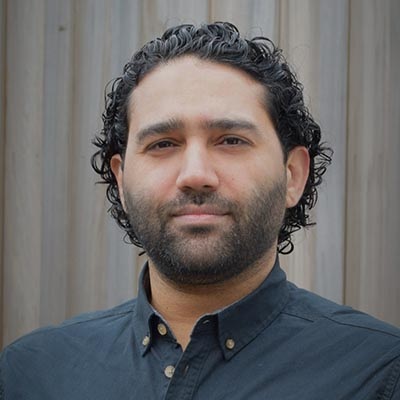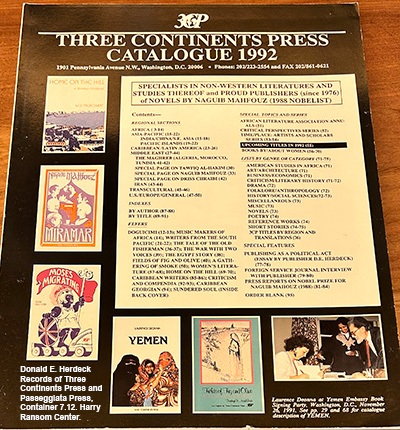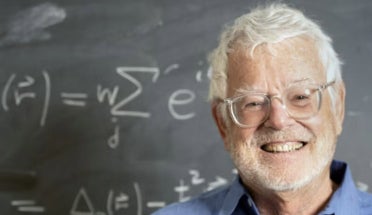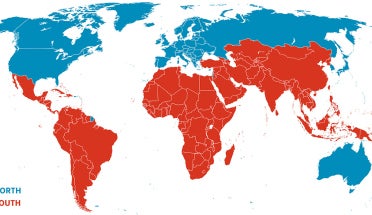
International Fellow Traces History of Arabic Literary Translation at Ransom Center
- Nov 29, 2023
- Alyssa Morris, Harry Ransom Center
[Editor’s Note: This article is the first in a Texas Global series created in partnership with the Harry Ransom Center to chronicle the stories of scholars who visit Austin from across the world to conduct research in the center's archives as part of the Ransom Center Fellowship program.]
The only thing Abdel-Wahab Khalifa didn’t enjoy about his time at The University of Texas at Austin was the weather.

A senior lecturer at Queen’s University Belfast studying the sociology of translation and Arabic literature in translation, he was accustomed to a milder Irish climate.
Khalifa had been awarded a fellowship by UT Austin’s Harry Ransom Center (HRC) that was intended to take place in 2020, but due to the pandemic, he was unable to visit until the summer of 2023. His time in Austin coincided with one of the city’s hottest months on record.
Welcoming Fellows from Across the Globe
Every year, the Ransom Center Fellowship program welcomes as many as 60 fellows from around the United States and the world to study the center’s extensive collections. More than half the fellows in any given year are international, hailing from the United Kingdom and Ireland as well as Australia, Morocco, Norway, South Africa and beyond.
Fellows are graduate students, professors and independent researchers who stay in Austin from one to three months, working extensively with archival material at the HRC. Their research and work results in scholarly articles, monographs, dissertations, performance-based research, exhibition proposals, creative projects and more.
Khalifa applied for the fellowship in order to study the Ransom Center’s Donald E. Herdeck Records of Three Continents Press and Passeggiata Press, focusing his research on “Publishing Arabic Literature in Translation: The Role of Three Continents Press.”
“I spoke to Jim [Kuhn, associate director for the Library Division], and he told me I’m the first external researcher to come work on the Three Continents Press archives, which I thought was very exciting,” said Khalifa. “There were a number of key documents I found in the archives.”
Deepening Transnational Research
According to Khalifa, “There is a real shortage of research that traces the sociohistorical trajectories of Arabic literary translation publishers in general (and 3CP in particular) and investigates English translations of modern Arabic literature works within their various discursive production contexts and in relation to the agents who commissioned and produced these works.”

One thing Khalifa was struck by was how comprehensive Herdeck’s records were. “The HRC has all of Herdeck’s documents — not just Three Continents Press but also all of his personal and professional records, including from his time in the Foreign Service,” he said.
This abundance of material allowed Khalifa to fill the gaps in correspondence he had first encountered in the archives of a British publisher at the University of Reading. Khalifa plans to publish articles based on the untold stories he uncovered in Austin.
Stewarding Archives and Researchers
During his monthlong residency at the Center, Khalifa took part in “Familiar Terms,” a lecture series that aims to connect staff and fellows through lunchtime conversations about creativity and archival research. Assistant Professor Levi Thompson from the Middle Eastern Studies Department at UT Austin facilitated the conversation.
“I feel like the fact that the Harry Ransom Center exists is an invaluable asset to research around the world,” said Khalifa. "The fact that you guys take care of the archives in such a way — but also the researchers [using the archives] — it’s just beyond fascinating."
Indeed, the center’s staff takes care to make sure that all fellows feel welcome. Fellowship Coordinator Danica Obradovic works with fellows before, during and after their arrival, helping them to secure visas and connecting them with curators, staff and a community of peers with whom they can exchange ideas.
Every Wednesday, fellows and center employees gather over coffee to share stories about what they have found during their work and provide advice about how to spend their free time in Austin. While Khalifa didn’t enjoy Austin’s weather, he did share some of his favorite experiences in the city.
“It was the people, food and hospitality of everybody I met. Barton Springs really stands out, but also the places that always have live music and something going on, that was very interesting. In the U.K., places usually close down quite early, but that wasn’t the case in Austin, which was amazing.”
In-Person Access Transforms Findings
Despite the fact that many archives, including the center, are working toward digitizing holdings to improve access, Khalifa emphasized that in-person access to documents was invaluable.
“History truly comes alive when researchers and historians engage with it, and archival research provides a direct window into historical events, offering us firsthand accounts written by those who experienced, enacted or enabled these events,” said Khalifa. “The physicality of touching these materials is a really valuable aspect — holding historical documents carried an unmatched significance.”
The Ransom Center Fellowship program also allowed Khalifa to make contact with scholars and others connected to his work.
“Meeting the people there has really opened doors,” he said. “I met the wife of the [archive’s] publisher, and I wouldn’t have had access to her without the HRC.”
Khalifa now sees this research as a lifelong project, thanks to the depth of study he was able to achieve at the Ransom Center. “I’m grateful to everybody I met and those I have not met. There is a team working behind the scenes in a stressful environment, making it extremely seamless for fellows,” he said.
The Harry Ransom Center is committed to providing experience and insight to research fellows from around the world. Fellowship applications typically open August 1 and close November 1.
Visit the HRC online to learn how to apply for a Ransom Center Fellowship.



